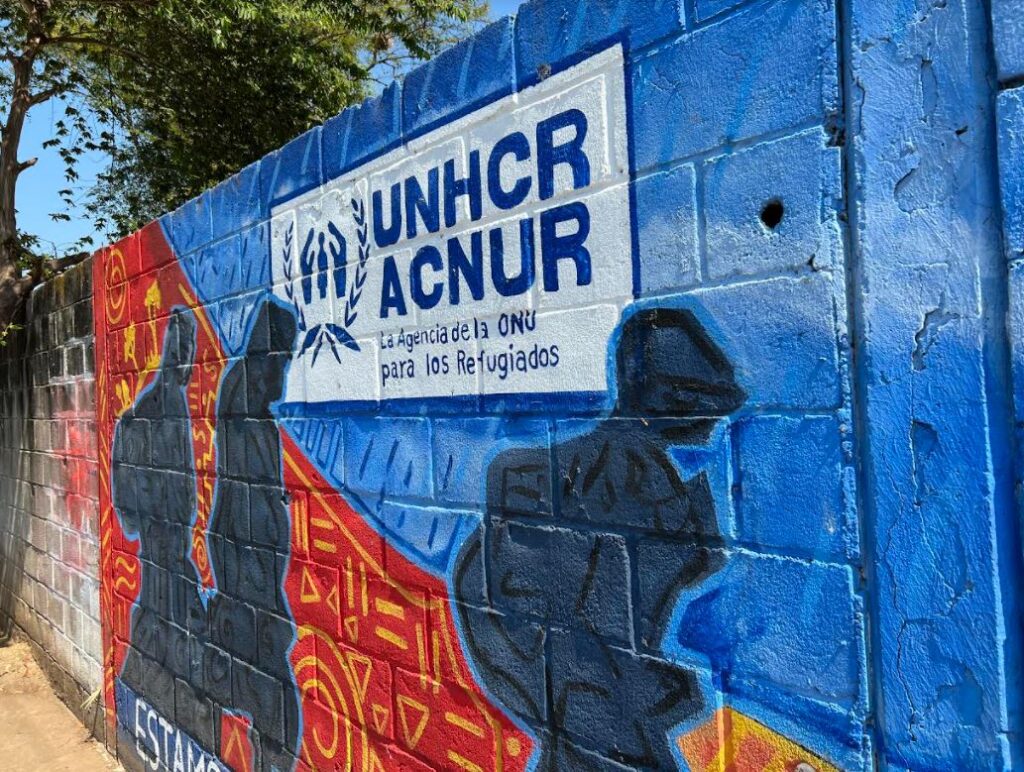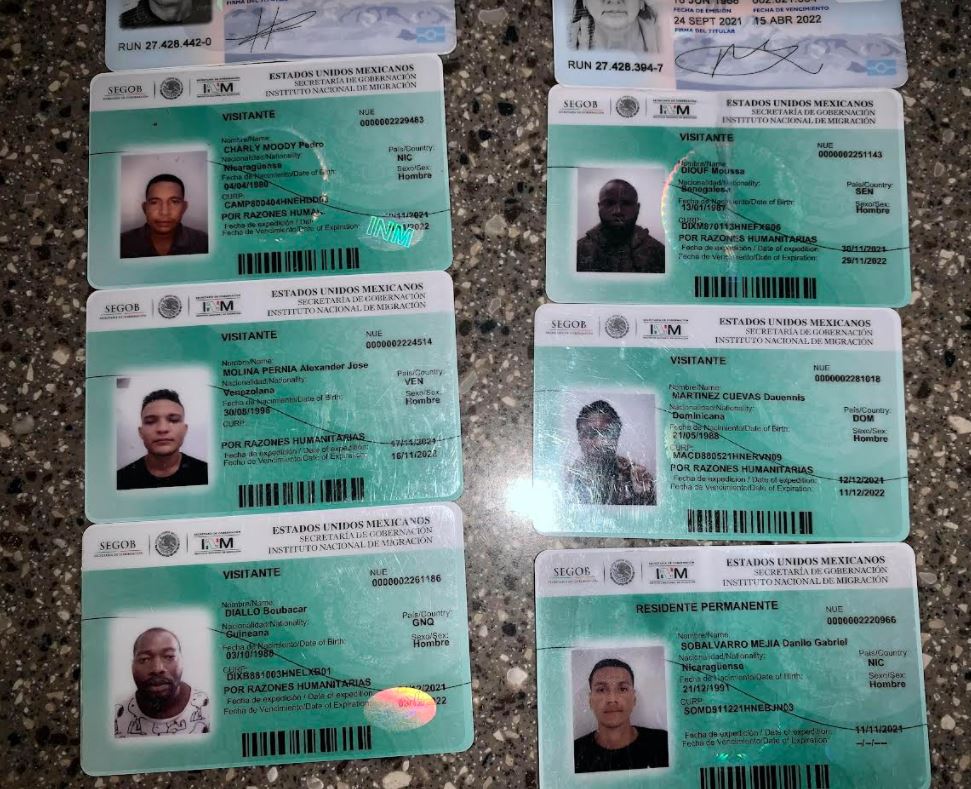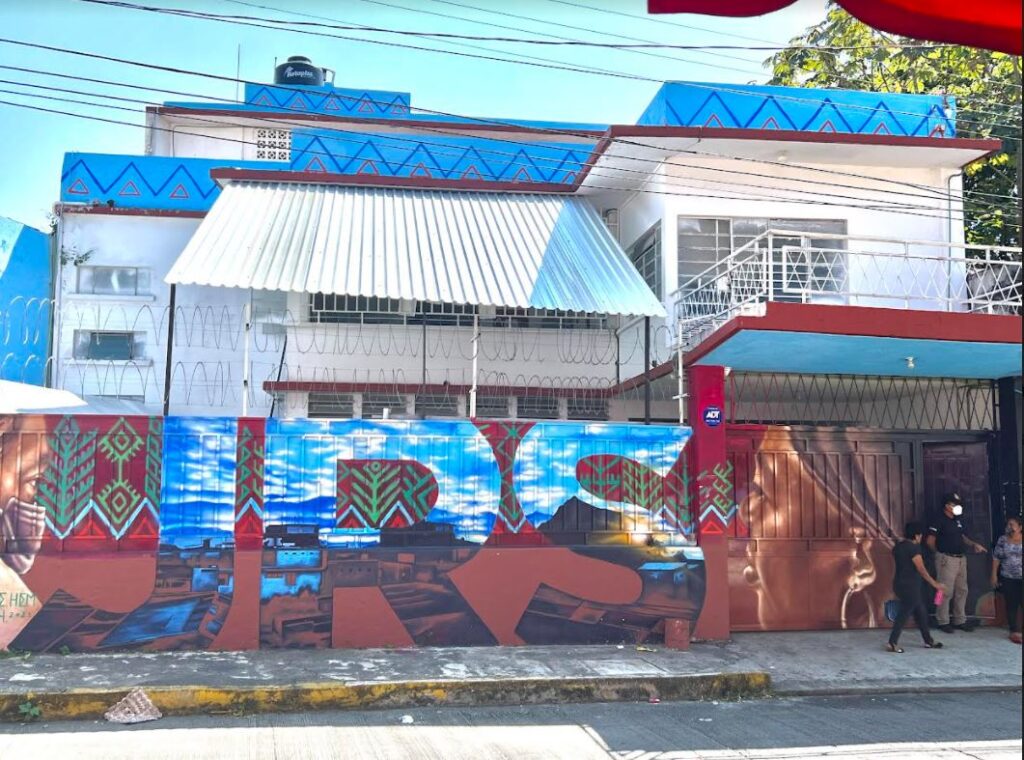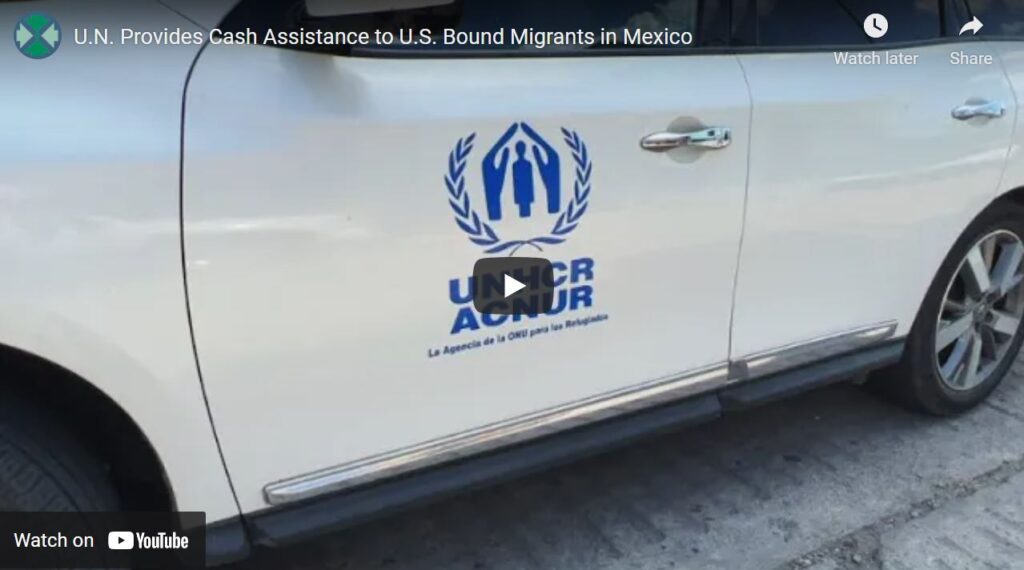
Those rejected for Mexican asylum get new stories to help with their appeals, allowing them to continue north to the U.S.
By Todd Bensman as originally published January 24, 2022 by the Center for Immigration Studies
See also: In Mexico’s Deep South, the United Nations Explains Handing Cash to U.S.-Bound Migrants and United Nations Agency Uses U.S. Tax Dollars to Fund Illegal Immigration
TAPACHULA, MEXICO – United Nations-funded immigrant service nonprofits in southern Mexico are offering an unusual and controversial psychological therapy to enable migrants to continue on the trail north to the U.S. border.

At least two UN-funded nonprofits with operations in the southern border states of Chiapas and Tabasco pay stables of clinical psychologists to help migrants recover “repressed memories” of government persecution and other hardship stories that qualify migrants for Mexican asylum and a residence card, allowing an eventual trip over the U.S. southern border. Thousands apparently have gone the recovered memory route after they were rejected for asylum because they told Mexican immigration authorities they just wanted to go to the United States to make money – an ineligible claim, unlike official government persecution.
With their newfound memories of more eligible claims, the immigrants get asylum (a term many use interchangeably with refugee status) and Mexican residency cards, which many then promptly use to pass through Mexico and make illegal entry over the American border.
Enrique Vidal, coordinator for the Fray Matias de Cordoba human rights center disclosed that United Nations money pays psychologists to unearth repressed memories of torture, persecution, and human rights violations after immigrant clients are denied asylum, to reverse denials on appeal.
“The most common mistake migrants make during interviews . . . is that they are saying that they are suffering economic hardship. It’s not one of the criteria for refugee status,” Vidal explained during a lengthy recorded telephone interview January 20 with the Center for Immigration Studies in Tapachula. “That may cover up one of the true reasons why they are coming. They need psychological help so they can remember the situation they experienced.”
Asked if recovering asylum-qualifying memories for better interview outcomes is the main purpose of employing psychologists with United Nations money, Vidal answered: “Yes, through the psychological help we give them.”

Most immigrants in Tapachula highly value Mexican refugee or asylum status (terms often used interchangeably in Mexico) because it qualifies them for residency cards that allow travel out of the southern border states. The government has endeavored to keep them bottled up in the southern states at the behest of the Biden administration, which hopes to lower record-breaking, and politically damaging, border apprehension numbers. With the residency cards, many holders make a beeline straight to the U.S. southern border and throw them away. (See accompanying photo.)
That UN-funded nonprofits draw on the controversial method in Mexican immigration processes that often end with immigrant beneficiaries traveling over the American southern border begs for greater public awareness, debate, and investigation as to its validity. Decades of controversy have dogged so-called “recovered memory therapy” in the United States, with some in academia concluding that it amounts to debunked science that too often implanted false memories. Some still believe it has value.
A 90 percent Approval Rate. According to Vidal, use of recovered memories during the interview with Mexican immigration adjudicators has produced a 90 percent approval rate.
“That’s the most important part of the process. That’s when the Mexican authorities listen to the motives of why they left their country. And those motives have to be according to international conventions,” Vidal said.
A potential issue is the appearance of coaching by both lawyers and psychologists to achieve the desired outcomes.
Vidal said his organization helps not only to unearth repressed memories of persecution for use in an appeal after a migrant is denied asylum or refugee status; the lawyers hold classes to make sure immigrants understand the asylum-winning requirements before they interview. Lawyers from around the world sometimes come to teach the classes, including from the United States, he said.
The trainers make sure their migrant students understand which testimonies to emphasize and which to not emphasize, Vidal explained.
“For example, if they have an economic need, that’s not necessarily one of the requirements. However, once we do our interview with them we find out they did suffer some type of violence or persecution or anything that qualifies as refugees, we tell them to emphasize those.”
Vidal did not have a detailed breakdown on how many immigrants his group helped to remember what Mexican immigration interviewers need to hear for a YES-box check. But he said his group’s lawyers and psychologists got 3,000 immigrants approved as refugees in 2019 and provided classroom training that year for 19,000 more.

How Widespread? Fray Mattias del Cordoba is not the only non-profit taking United Nations money to help immigrants recover memories that enable them to get to the United States border.
Another organization perhaps a half mile away in Tapachula called Servicio Jesuita a Refugiados also advertises that it provides “legal and psychological” services to immigrants trying to move out of Mexico’s southern provinces. Its website and a brochure say the United Nations funds the organization. The brochure prominently features the insignia of the UN High Commissioner for Refugees (UNHCR, or ACNUR in Spanish). Its director could not be reached, but an employee at the door said the agency helps rejected asylum seekers with their appeals.
Vidal said the Jesuits maintain at least one facility providing the services in next door Tabasco state, which also sees high migrant traffic coming in from Guatemala.
On a recent visit to the Jesuit facility in Tapachula, CIS asked a Honduran mother why she was waiting in a line with a young child at the front door. A worker was arranging for appointments at the door with a security guard, some dozen migrants waiting their turn in a line outside.
“Mexican immigration rejected me for asylum,” she answered. Asked why, the woman explained that Mexican immigration turned her down because she told them she wanted to go the United States to work and make money.
CIS also discovered a local law firm whose lawyers formed a foundation that accepts donations from major international corporations, such as Toyota and Halliburton, also to provide psychological and legal services to immigrants seeking Mexican residency cards.
Unethical Coaching? All of this raises obvious questions. For instance, if these trainings and memory recovery methods were more widely known, would they not give rise to perceptions that the UN-funded nonprofit organizations are operating unethical coaching and asylum fraud mills that enable tens of thousands of migrants make it to the U.S. southern border?
Asked how he would respond to an allegation like that about his non-profit, Vidal pointed to the high Mexican acceptance rate as the only evidence he needed that the memories his counselors were helping migrants recover are real.
“If the majority of people were lying, we wouldn’t be successful. The Mexican authorities would not recognize them as refugees,” he said. “If we have a high percentage of success, it’s because we have truth. With migrants, it’s harder to lie. The authorities would find out about it.”
He acknowledged, however, that Mexican immigration adjudicators conduct no verification investigations of the stories.
In recent months, some border hawks and Republican members of Congress have strongly criticized the United Nations in Latin America for providing cash debit cards and other forms of assistance that they believe helps fuel the migration crisis. A dozen Republican lawmakers have signed on to a proposed bill to defund the United Nations over activities they regard as aiding and abetting illegal immigration.
CIS asked a United Nations spokesperson to comment on those programs and criticisms. In an emailed response, Silvia Garduno demurred.
“UNHCR is a politically neutral, strictly humanitarian organization,” she wrote. “We are always ready to discuss our work around the world with anyone interested. UNHCR respects the U.S. legislative process and does not comment on specific legislation related to allocation of government funds and resources.”
However, elsewhere in her response, Garduno referenced the international agency’s work with Mexico’s asylum system.
“UNHCR’s work in Mexico centers on helping the Mexican government improve its national asylum system,” she wrote, in part. The agency’s Mexico operation along the Guatemala border “works to ensure refugees in Mexico know their rights and have the opportunity to seek asylum in Mexico.” The agency provides information “on the right to seek asylum and assists individuals while their applications are in process.”
Excerpts from Bensman Interview with Enrique Vidal of Fray Matias de Cordova
Todd: What is the most common mistake that you see migrants in Tapachula make in these interviews?
Enrique: The Mexican authority always looks for the person to express their motives or economic necessity and when the person recognizes that it’s because of the economic need then the Mexican authority denies the refuge because it’s not one of the requirements. But that is basically a trap from the Mexican authorities because having an economic necessity does not exclude that as being one of the reasons -if- they had previously suffered from other of the requirements where they could be recognized as refugees.
Todd: Wait, wait a moment.
Enrique: And in other cases since they have other traumatic events for the people they need of a lot of psychological assistance to clear things in their memories so that they can remember what they went through in their country.
Todd: what do you mean by that.
Enrique: Yes, for example people suffered different acts of violence, sexual abuses, detentions and or tortures. It causes a big stress and can cause memory loss of dates when they suffered. Then the Mexican authority says it’s not believable, their cases, but in reality they are suffering from previous traumas of their situations.
Todd: So does your group help them remember the details of these qualifying traumas?
Enrique: Yes, based on the Psychological support we provide. So not only do we have a team of Lawyers we also have a team of psychologists specifically for this purpose. And finally, the people when they arrive to Mexico they feel persecuted by the Mexican authorities and sometime they don’t provide them the trust in the interview.
Todd: Ok how often would you say your team helps them remember their traumatic situations, like give me ideas? How common is that?
Enrique: All the time.
Todd: So are most of the people you are helping people who already made the mistake of not telling the authorities their traumatic experiences that qualify?
Enrique: Yes, that’s how it is.
Todd: So most of the people you are helping have already been declined. Most of your clients have already been declined?
Enrique: well in reality most of the people contact us before recurring to the process and there is a minority of people that contact us once they have been denied.
Todd: Oh ok a minority.
Enrique: So basically we do a lot of prevention work, we provide the legal assistance before they began the process so that they do not commit an error in their process.
…
Todd: Ok so know let’s move to the psychologists, who are they?
Enrique: They are also Mexican nationals that studied Psychology and they emphasize in Social Psychology not in Clinical.
Todd: Like counselors they can’t prescribe medicine or something like that.
Enrique: No, in general we recognize that the person might have several mental issues. With good psychological treatment and counseling, medication is not necessary.
Todd: But..but Primarily, these people are there to help them unearth buried memories is that accurate to say.
Enrique: What was that I did not understand that.
Auden: He’s basically asking that the Psychologist service is to unbury their memories.
Enrique: that…and to stabilize their emotional situation once they arrived to Mexico and to identify they can be in Mexico in a stable manner.
Todd: it’s very um what is the term there’s a term I heard before about this whole thing of buried emotions.
Enrique: Terms? Well yes we have two terms that we use that are recognize the impacts on a traumatic event, and the second one is the recognition of coping. They are medical terms
Todd: They suppress, so this is about suppressed memory trauma makes people suppress their memory.
Enrique: No not suppress. It is the contrary, like re-establish the trauma.
Todd: Unearth?
Enrique: And they can express in a dignified and relaxed manner.
…
Enrique: By accepting a refugee status it prevents them a detention or deportation process. But we have an immense number of cases of persons that are being detain and deported but have their refugee status in process. Which is violating their rights according to the Mexican law and International treaty’s. And another service is the assist them is in the Interview process for guidance.
Todd: But what kind of guidance.
Enrique: in the interview it’s the most important part of the process because it’s the moment when the Mexican authorities listen to their cases and their motives they had as to why they left their country. their Motives have to be according to the international laws.
Todd: so you provide do you have lawyers that are helping with this?
Enrique: Yes, we do have a team of lawyers assisting the cases.
Todd: Ok so these lawyers will be present during the interview or help them before the interview?
Enrique: Both, depending on the situation if we that they are vulnerable we provide them assessment and finally when the people are rejected we provide legal resources to appeal before the Mexican Federal Courts.
Todd: Why do these immigrants need legal help for their interviews what kind of trouble do they face if they are alone?
Enrique: well there a lot of barriers and I will explain some. Number one there is a waiting list of approximately 3-4 months just to start the refugee process. Then a second barrier is that the persons do not know the motives as to how they can be recognized as refugee. For example, everyone has an unstable economic needs problem the refuge will not be accepted as its not one of the requirements under the immigration process. However, when we interview the persons, we discover that they have motives as to why they fled their country due to violence or risks of tortures or detentions that may qualify for the refugee status.
…
Todd: Oh ok. I have to ask you this you know that there are going to be people in the United States, probably Republican people who will read about what you do. They’ll see this thing about repressed memories, helping to come up with details traumatic experience, and they are going to make fun of this and say that you are just coaching to get this lie this way. What would be your response to Republican types with things like this. You know they are going to say this. They are going to say this.
Enrique: Yes, they have told us before on other occasions.
Todd: So what is your response
Enrique: Well I’d think in two responses. One of them… it’s necessary to gain a better understanding of knowing their situations in the country of origin. About their context in their country to understand the stories are not an exception but are happening to the majority of the population. It’s important to recognize that they are not an exception in their countries. and Number two is more of a psychological answer, which is maybe a lot of people who have faced the situations…to explain something that they [Mexican immigration adjudicators] will not believe happened. And it is more complicated to explain when you know they will not believe you. It’s hard to convince them.
Todd: Yeah yeah I think there will be Americans who will read this and say you are coaching immigrants to lie to get their refugee status … What do you say to that?
Enrique: IF in the majority of the cases the people would be lying we wouldn’t be successful. The authorities would not approve of our cases as refugees. If we have a high percentage of success, it is because it the truth about what the people are saying. Because for a migrant, it is much more difficult to lie…and the authorities would find out about that. The other thing is that we have a very good relationship with the authority in charge of the procedures of refuge that is different of that of the Immigration Law. And this authority believes in us in our work and our organization.
Todd: Ok Ok . But you would dispute completely you are coaching these people to say what they need to say to get refugee status?
Enrique: yes of course we deny completely because the situation of the people is so dramatic is hard to lie in that type of situation. Only a person that has lived and experienced those things has the capacity to explain them.
Todd: But you know the Mexican authorities that are hearing these stories don’t really have the resources to investigate the stories, do they?
Do they ever investigate? To verify the stories.
Enrique: Yes, well the Mexican authority in charge of the refuge that is called Commission Mexicana de aura a Refugio’s Mexican Commission for Refuge Help “COMAR” have a list of information about the situation in every country. This information is provided by de Secretary of External Relations of Foreign Affairs
Todd: But even American authorities don’t have the resources, when they hear a story of persecution and torture, they can’t possibly verify them. Even the Americans can’t possibly verify the stories. They just… you know how it is …they just say ok. They don’t have the ability to make an investigation on thousands of cases.
Enrique: Yes, well
Todd: And the Americans are rich!
Enrique: well one is that United States receives much more fillings from much more countries than what Mexico receives and Mexico is easier.
Todd: Ok well I think what else should I know about your operations do you have any number for me like how many you help or any kind of information like that.
Enrique: well before the pandemic in 2019, 18,000 people arrived to our offices in which we followed 3,000 people in their process individually in there filing as per the rest we gave collective assessment.
Todd: oh wow that’s a lot.
Enrique: yes, we have a lot of work
Todd: is it accurate to say the message and the teaching to deemphasize the economic need and increase the emphasis of the traumatic experience is accurate?
Enrique: well yes the more violence the person has experienced, generally they had to relocate within its country and, before losing their homes, they also lost their jobs. A person who is fleeing because of violence is also suffering financially.
Todd: yeah but I guess what I mean is… if a migrant tells the authorities I’m coming to get a better job… I don’t have job opportunity in Haiti or Guatemala and that’s the main reason I am going to the United States they’re not going to get in. They will be declined.
Enrique: Exactly
Todd: the information they get from you is… don’t say that as much as the other things as to why you left.
Enrique: Exactly but we have to explain why they can’t get a job because behind that reason violence had occurred and fear the return back to their country.